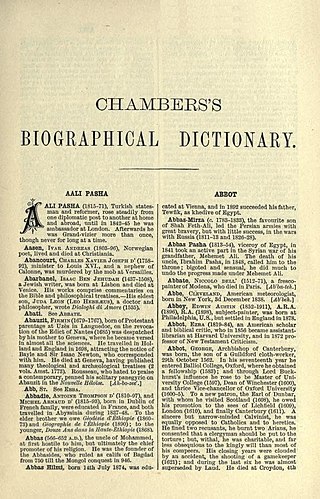Related Research Articles

A dictionary is a listing of lexemes from the lexicon of one or more specific languages, often arranged alphabetically, which may include information on definitions, usage, etymologies, pronunciations, translation, etc. It is a lexicographical reference that shows inter-relationships among the data.

Scrabble is a word game in which two to four players score points by placing tiles, each bearing a single letter, onto a game board divided into a 15×15 grid of squares. The tiles must form words that, in crossword fashion, read left to right in rows or downward in columns and are included in a standard dictionary or lexicon.

A crossword is a word game consisting of a grid of black and white squares, into which solvers enter words or phrases ("entries") crossing each other horizontally ("across") and vertically ("down") according to a set of clues. Each white square is typically filled with one letter, while the black squares are used to separate entries. The first white square in each entry is typically numbered to correspond to its clue.

A cryptic crossword is a crossword puzzle in which each clue is a word puzzle. Cryptic crosswords are particularly popular in the United Kingdom, where they originated, as well as Ireland, the Netherlands, and in several Commonwealth nations, including Australia, Canada, India, Kenya, Malta, New Zealand, and South Africa. Compilers of cryptic crosswords are commonly called setters in the UK and constructors in the US. Particularly in the UK, a distinction may be made between cryptics and quick crosswords, and sometimes two sets of clues are given for a single puzzle grid.

The Macquarie Dictionary is a dictionary of Australian English. It is considered by many to be the standard reference on Australian English. It also pays considerable attention to New Zealand English. Originally it was a publishing project of Jacaranda Press, a Brisbane educational publisher, for which an editorial committee was formed, largely from the Linguistics department of Macquarie University in Sydney, Australia. It is now published by Macquarie Dictionary Publishers, an imprint of Pan Macmillan Australia Pty Ltd. In October 2007 it moved its editorial office from Macquarie University to the University of Sydney, and later to the Pan Macmillan offices in the Sydney central business district.

Brewer's Dictionary of Phrase and Fable, sometimes referred to simply as Brewer's, is a reference work containing definitions and explanations of many famous phrases, allusions, and figures, whether historical or mythical.

Chambers's Encyclopaedia was founded in 1859 by William and Robert Chambers of Edinburgh and became one of the most important English language encyclopaedias of the 19th and 20th centuries, developing a reputation for accuracy and scholarliness that was reflected in other works produced by the Chambers publishing company. The encyclopaedia is no longer produced.
A pet peeve, pet aversion, or pet hate is a minor annoyance that an individual finds particularly irritating to a greater degree than the norm.

The Shorter Oxford English Dictionary (SOED) is an English language dictionary published by the Oxford University Press. The SOED is a two-volume abridgement of the twenty-volume Oxford English Dictionary (OED).
The Imperial Dictionary of the English Language: A Complete Encyclopedic Lexicon, Literary, Scientific, and Technological, edited by Rev. John Ogilvie (1797–1867), was an expansion of the 1841 second edition of Noah Webster's American Dictionary. It was published by W. G. Blackie and Co. of Scotland, 1847–1850 in two large volumes.
Collins Scrabble Words is the word list used in English-language tournament Scrabble in most countries except the US, Thailand and Canada, although Scrabble tournaments in the US and Canada are also organized with divisions that use Collins Scrabble Words as their lexicon, some under the auspices of organizations such as the Collins Coalition. The term SOWPODS is an anagram of the two abbreviations OSPD and OSW, these being the original two official dictionaries used in various parts of the world at the time. Although the two source dictionaries have now changed their respective titles, the term SOWPODS is still used by tournament players to refer to the combination of the two sources. There has not been any actual hard-copy list produced called SOWPODS, although the current Collins Scrabble Words, or CSW, is in effect the full SOWPODS list by a different name.

William Chambers of Glenormiston was a Scottish publisher and politician, the brother of Robert Chambers. The brothers were influential in the mid-19th century, in both scientific and political circles.
A slang dictionary is a reference book containing an alphabetical list of slang, which is vernacular vocabulary not generally acceptable in formal usage, usually including information given for each word, including meaning, pronunciation, and etymology. It can provide definitions on a range of slang from more mundane terms to obscure sexual practices. Such works also can include words and phrases arising from different dialects and argots, which may or may not have passed into more common usage. They can also track the changing meaning of the terms over time and space, as they migrate and mutate.

Jonathan Crowther is a British crossword compiler who has for over 50 years composed the Azed cryptic crossword in The Observer Sunday newspaper. He was voted "best British crossword setter" in a poll of crossword setters conducted by The Sunday Times in 1991 and in the same year was chosen as "the crossword compilers' crossword compiler" in The Observer Magazine "Experts' Expert" feature.

Azed is a crossword which appears every Sunday in The Observer newspaper. Since it first appeared in March 1972, every puzzle has been composed by Jonathan Crowther who also judges the monthly clue-writing competition. The pseudonym Azed is a reversal of Deza, a Spanish inquisitor general. This combines the inquisitorial tradition of Torquemada and Ximenes with the wordplay element of a British cryptic crossword.

Chambers Biographical Dictionary provides concise descriptions of over 18,000 notable figures from Britain and the rest of the world. It was first published in 1897.
Harrap's Shorter French Dictionary, published by Chambers Harrap Publishers, is one of the best known English/French bilingual dictionaries in the United Kingdom and France. The eighth edition was published in April 2007. In the United States it is sold under the title Harrap's French and English College Dictionary.
Chambers is a reference publisher formerly based in Edinburgh, Scotland, which held the property rights of W. & R. Chambers Publishers.

Popeseye steak is thinly sliced rump steak, originating in Scotland.

Green's Dictionary of Slang (GDoS) is a multivolume dictionary defining and giving the history of English slang from around the Early Modern English period to the present day written by Jonathon Green. As a historical dictionary it covers not only slang words in use in the present day but also those from the past which are no longer used, and illustrates its definitions with quotations. It is thus comparable in method to the Oxford English Dictionary (OED) though with a narrower scope, since it includes only slang words; nonetheless it is more comprehensive within its scope, containing 125,000 items of slang while the OED has only 7,700 terms carrying a slang label.
References
- ↑ Words, Wit and Wisdom: 100 Years of the Chambers Dictionary, compiled by Ian Brookes, Jamie Nathan and Hazel Norris. Edinburgh: Chambers Harrap Publishers Ltd, 2001. ISBN 0-550-10015-6.
- ↑ Manley, Don (2001) [1986]. "The Basic Advanced Cryptic Crossword". Chambers Crossword Manual (Third ed.). Edinburgh: Chambers. p. 91. ISBN 0-550-12006-8.
If you pause to read Chambers while solving a puzzle, you may also find some quirky definitions in the best Johnsonian tradition: try ECLAIR and MIDDLE AGE for example.
- ↑ Kaminski, Mariusz (2013). A History of the Chambers Dictionary. Walter de Gruyter. pp. 95–96. ISBN 9783110312737.